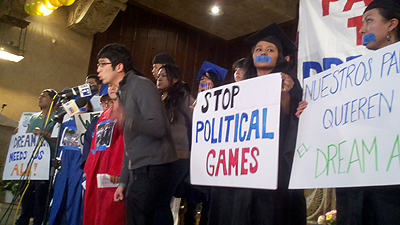
Kevin Kang speaking at a DREAM Act rally in Brooklyn, NY. (Photo: Catalina Jaramillo)
This article originally appeared on WNYC.org.
Less than 24 hours after the House passed the DREAM Act on Wednesday by a margin of 216-198, the Senate voted to table its version of the bill, and will most likely take up the House version next week. Postponing the vote was a strategic decision because Republicans had threatened a filibuster if the DREAM Act came up before a vote to extend Bush era tax-cuts.
The DREAM Act would allow young undocumented immigrants to apply for citizenship if they attend college or enter the armed forces for two years. Advocates have been holding vigils and hunger strikes this week to press for passage. President Obama supports the bill.
The vast majority of the New York Representatives voted for the DREAM Act. Out of the five who did not, three were Democrats: Michael Arcuri (D-24), Brian Higgins (D-27), and Bill Owens (D-23). The Republicans were Peter King (R-3) and Chris Lee (R-26).
Supporters were cheered by last week’s Congressional Budget Office report that estimated the DREAM act would generate $2.3 billion in tax revenue with the addition of 800,000 workers, and cut the deficit by $1.4 million over the next ten years. But opponents said that the bill would increase projected deficits by between $5 billion and $20 billion between 2021 and 2061.
Undocumented immigrants who are under the age of 30, who came to the United States before the age of 16 and have lived here for five consecutive years with a clean record would be eligible for the DREAM Act. This is the fifth – and most restrictive – version of the bill that has been introduced in Congress so far. Applicants for citizenship would have to remain in conditional non-immigrant status for 10 years before they could apply for naturalization.
The decision to table discussion does not rule out a Senate vote before the end of the lame duck session, but it will face a tough fight to win the necessary 60 votes.
Feet in Two Worlds is supported by the New York Community Trust, the John S. and James L. Knight Foundation and the Mertz Gilmore Foundation.




